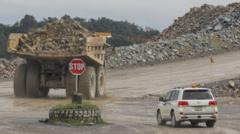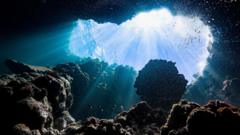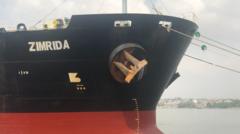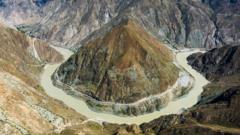This article explores the implications of seabed mining and international law.
U.S. Moves Closer to Seabed Mining Near American Samoa

U.S. Moves Closer to Seabed Mining Near American Samoa
The Interior Department's review could signal major shifts in ocean resource extraction policies.
Commercial mining ventures in the depths of the Pacific Ocean advanced significantly this week with the U.S. Interior Department's announcement to assess a proposal from Impossible Metals, a California-based company, aimed at extracting vital metals from seabed resources off American Samoa. The announcement follows a recent executive order that encourages government entities to accelerate the permitting process for seabed mining within both U.S. territorial and international waters.
Nations around the globe are increasingly concerned about the growing dependence on China's monopoly over crucial minerals such as nickel, cobalt, and manganese—materials essential for advanced technologies contributing to national security and economic stability. The seabed in certain regions contains these potato-sized nodules that can be economically beneficial if mined.
Historically, no commercial seabed mining operations have been conducted, largely due to technological challenges and pressing environmental concerns. Nonetheless, the rising demand for these metals has prompted several countries to seek rapid development of seabed mining capabilities.
Internationally, a United Nations treaty, which the U.S. has not ratified, mandates that mining in international waters should proceed only after regulatory and environmental frameworks are established. President Trump’s recent executive order has sparked significant backlash from various governments and environmental advocates, indicating that unilateral U.S. permits may contradict accepted international law, raising questions about legal and ethical implications moving forward.
Nations around the globe are increasingly concerned about the growing dependence on China's monopoly over crucial minerals such as nickel, cobalt, and manganese—materials essential for advanced technologies contributing to national security and economic stability. The seabed in certain regions contains these potato-sized nodules that can be economically beneficial if mined.
Historically, no commercial seabed mining operations have been conducted, largely due to technological challenges and pressing environmental concerns. Nonetheless, the rising demand for these metals has prompted several countries to seek rapid development of seabed mining capabilities.
Internationally, a United Nations treaty, which the U.S. has not ratified, mandates that mining in international waters should proceed only after regulatory and environmental frameworks are established. President Trump’s recent executive order has sparked significant backlash from various governments and environmental advocates, indicating that unilateral U.S. permits may contradict accepted international law, raising questions about legal and ethical implications moving forward.


















